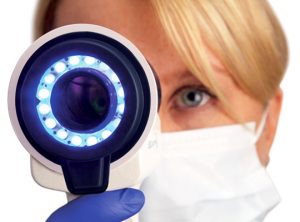Velscope
 VELscope® is a revolutionary hand-held device that uses a narrow band high energy blue light & viewing filter. This direct visualization helps your dental professional immediately differentiate between normal and abnormal pre-cancerous/cancerous cells by identifying suspicious areas not evident under traditional white light or by the naked eye, potentially providing for earlier cancer detection.
VELscope® is a revolutionary hand-held device that uses a narrow band high energy blue light & viewing filter. This direct visualization helps your dental professional immediately differentiate between normal and abnormal pre-cancerous/cancerous cells by identifying suspicious areas not evident under traditional white light or by the naked eye, potentially providing for earlier cancer detection.
Facts about oral cancer!
Oral cancel (cancer of the mouth, tongue, cheeks and gums) affects 34,000 Americans every year.
1 person dies from oral cancer every hour of every day.
25% of the people diagnosed with oral cancer have no risk factors.
Of the people diagnosed with oral cancer, 50% will not live beyond 5 years.
Early detection of oral cancer is highly curable if diagnosed and treated early and raises the survival rate to 80%!
Do I need a VELscope® screening if I don’t smoke?
While oral cancer is traditionally associated with tobacco usage, more and more oral cancer is striking young people via the human papilloma virus (HPV-16 or HPV-18), those that consume alcohol and adults over age 40. As a result, health care experts recommend annual oral cancer screenings for all adults aged 18 and older. If you smoke or use chewing tobacco, screenings are recommended every six months. Without yearly screening oral cancer is discovered in the late stages only about 70% of the time, and often that is simply too late
How long does the test take?
The VELscope® screening test is non-invasive, safe and painless. It only takes about 2 minutes as part of a regular hygiene check-up but gives you the edge in fighting oral cancer early on.
What if we find something?
In most cases the VELscope® screening will indicate that there is nothing to worry about. It is possible however that some suspicious areas could be revealed. In that case we will monitor the suspicious-looking areas to determine if there is another cause for the result such as cheek biting or irritation from dentures/braces. If the area does not improve, we may recommend further examination and evaluation by an oral surgeon
